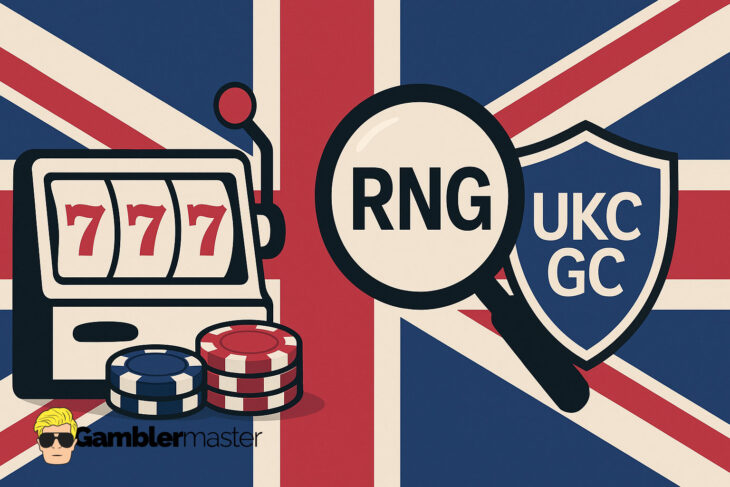Are Online Casinos Rigged?
By

It’s the question on every gambler’s mind when a losing streak hits or a jackpot seems perpetually out of reach: Are online casinos rigged?
If you’ve ever found yourself wondering whether those digital slot reels or virtual card decks are truly fair, you’re not alone. UK players wager billions annually online, all while questioning if they’re getting a fair shake.
In this comprehensive guide, Gamblermaster cuts through the myths and misconceptions to reveal exactly how fairness is enforced in UK online casinos.
What are the sophisticated systems that ensure game integrity, the rigorous regulatory framework that protects players, and the practical steps you can take to identify legitimate operators?
By the end, you’ll understand not just how casino fairness works, but how to make safer, more informed gaming choices.
Debunking the “Rigged” myth: Separating fact from fiction
The word “rigged” conjures images of secret switches, manipulated outcomes, and shadowy figures ensuring the house always wins. While isolated cases of genuine rigging have occurred throughout gambling history, these incidents are extraordinarily rare in the regulated UK market, and for good reason.
Historical Context: When did casinos possibly cheat?
Before stringent regulation, questionable practices did exist:
- In the 1990s, early internet casinos operating from loosely regulated jurisdictions occasionally tampered with game outcomes
- Several high-profile cases involved delayed or refused payouts based on dubious “technical malfunction” claims
- Some early software platforms contained vulnerabilities that were exploited by both players and operators
These historical cases fuel today’s suspicions, but they also prompted the development of the robust regulatory frameworks now protecting UK players.
The house edge isn’t rigging—It’s mathematics
Many players misinterpret the casino’s built-in mathematical advantage as evidence of rigging. In reality:
- The house edge is a transparent, mathematically calculated advantage built into every casino game
- This edge ensures the casino remains profitable over time, not by cheating individual players but through statistical certainty across millions of plays
- UK casinos must disclose their Return to Player (RTP) percentages, giving players advance knowledge of the mathematical odds
A truly rigged game would involve deceptively altering these stated odds—something that licensed UK operators cannot do without severe regulatory consequences.
How online casino games are fair: The tech behind the trust
The fairness of modern UK online casinos rests on sophisticated technology and independent verification processes that would have been unimaginable just decades ago.
Random Number Generators: The digital dice
At the heart of every online casino game is a Random Number Generator (RNG)—a complex algorithm that produces unpredictable sequences of numbers:
- RNGs use mathematical formulas to generate thousands of random numbers per second
- These numbers determine all game outcomes—which card is dealt, where the roulette ball lands, or which symbols appear on a slot reel
- True RNGs cannot be predicted or manipulated without fundamentally altering the software, changes that would be detected during mandatory testing
Unlike mechanical casino equipment that can wear down or be tampered with, properly certified RNGs provide a level of randomness that exceeds even the most meticulously maintained physical equipment.
Return to Player (RTP): The long-term fairness metric
RTP represents the percentage of wagered money that a game will pay back to players over time:
- UK slots typically offer RTPs between 90 and 97%
- Table games like blackjack and baccarat often reach 97-99%
- Video poker can exceed 99% with optimal play
These percentages represent thousands of testing rounds and must be verifiable through independent auditing. While individual sessions may vary widely, the RTP ensures that over time, the game performs exactly as advertised.
Independent testing and certification process
Before any game reaches UK players, it undergoes a rigorous certification process:
- Game developers create and internally test their software
- The completed game is submitted to an approved Test House (such as eCOGRA or iTech Labs)
- Test Houses conduct thousands of simulated plays to verify RNG performance and RTP accuracy
- Statistical analysis confirms the game’s outcomes match theoretical expectations
- Only after passing these tests can the game be submitted to the UKGC for approval
This multi-layer verification process ensures that when you play at a licensed UK casino, the games perform precisely as they claim.
The UKGC’s role in ensuring fairness: Regulation that protects players
The UK Gambling Commission stands as one of the world’s most rigorous regulatory bodies, with extensive powers to enforce fair play and penalise non-compliance.
Licensing requirements: The foundation of trust
UKGC licensing is the gold standard of online gambling regulation:
- Operators undergo exhaustive background checks, financial vetting, and technical assessments
- Ongoing compliance monitoring includes regular audits and reporting requirements
- License fees and potential penalties create significant financial incentives for compliance
- Licenses can be revoked for serious or repeated violations
- Top payment method PayPal only partners with UK casinos with a UKGC license
This comprehensive approach means that UKGC-licensed casinos have compelling reasons to maintain fair games—the cost of cheating far outweighs any potential short-term gain.
Remote technical standards: Blueprint for fairness
The UKGC’s Remote Technical Standards (RTS) establish detailed requirements for game fairness:
- RTS requirements specify acceptable RNG implementations and testing methodologies
- Games must meet minimum RTP thresholds and accurately disclose these figures to players
- Testing must verify that bonus features and special game modes adhere to stated rules
- Games cannot be designed to create “near miss” effects that mislead players about their chances of winning
These standards are regularly updated to address new game types and technologies, ensuring that regulation keeps pace with innovation.
The eServices games register and ongoing monitoring
Once approved, all games must be registered in the UKGC’s eServices platform:
- Complete RNG and game test reports must be submitted by approved Test Houses
- Any game updates or modifications require fresh testing and approval
- The UKGC monitors Gross Gambling Yield (GGY) data to identify potential anomalies
- This includes scrutiny of how bonuses and promotions impact actual returns to players
This continuous oversight means that unlike in some jurisdictions, UK casino games remain under regulatory scrutiny throughout their entire lifecycle.
Spotting legit vs. Rogue casinos – Practical information for players
While the UKGC provides robust regulatory protection, players still need to know how to identify trustworthy operators and avoid potential scams.
License verification: The first defensive line
Always verify a casino’s licensing status before playing:
- UKGC-licensed casinos must display their license number in the footer of their website
- This number can be cross-checked on the Gambling Commission’s public register
- The license should be active and free from conditions or sanctions
- Be wary of sites claiming to be “in the process” of obtaining a license
Remember that only UKGC-licensed casinos are legally permitted to offer services to UK players—offshore operators accepting UK customers are operating illegally.
Software provider reputation: Quality by association
The companies that develop casino games have their reputations to protect:
- Established providers like Microgaming, NetEnt, Playtech, and Evolution Gaming undergo regular auditing
- These companies have invested millions in developing certified RNG systems
- They supply games to hundreds of casinos worldwide and cannot risk their business by partnering with rogue operators
- The presence of these providers generally indicates that a casino meets minimum technical standards
A diverse game library featuring well-known providers is typically a positive sign, though it should not replace proper license verification.
Red flags in Terms and Conditions
Always review a casino’s T&Cs for these warning signs:
- Vague withdrawal conditions or excessive processing times
- Unreasonable wagering requirements attached to bonuses
- Clauses allowing the casino to void winnings for unspecified “irregular play”
- Ambiguous language about game fairness or RTP figures
- Restrictions on maximum withdrawals, especially for progressive jackpots
Legitimate UK casinos must have fair and transparent terms that are approved by the UKGC. Predatory terms are often the first indication of an untrustworthy operator.
Frequently Asked Questions
Can I trust offshore casinos that accept UK Players?
No. Since the 2014 Gambling Act amendments, operators must hold a specific UKGC license to legally serve UK customers. Offshore casinos accepting UK players are:
- Operating illegally under UK law
- Not subject to UKGC game fairness requirements
- Outside the jurisdiction of UK consumer protection
- Unable to advertise their services within the UK
If you encounter issues with an offshore casino, you’ll have limited recourse and no regulatory protection.
How Often Are Online Casino Games Re-tested?
Under UKGC requirements:
- Games undergo initial certification before release
- Any game modifications require fresh testing and approval
- Annual audit reports must be submitted by operators
- The UKGC can request additional testing if concerns arise
Additionally, many software providers conduct their own regular reviews to ensure continued compliance and performance.
What Should I Do If I Suspect a Game Is Rigged?
If you have legitimate concerns about game fairness:
- Document the issue with screenshots or video recordings
- Contact the casino’s customer support with specific details
- If unsatisfied with their response, request a formal internal investigation
- For UKGC-licensed casinos, you can escalate complaints to approved Alternative Dispute Resolution (ADR) providers
- As a final step, report your concerns directly to the Gambling Commission
Remember that unusual outcomes are often the result of normal statistical variance rather than manipulation. However, licensed operators must take all fairness complaints seriously.
Licensed UK Casinos Are Overwhelmingly Fair
The evidence is clear: when playing at properly licensed and regulated UK online casinos, the games are not rigged. The combination of sophisticated RNG technology, independent testing, and stringent UKGC oversight creates multiple layers of protection for players.
While the house will always have its mathematical edge, this advantage is transparent and disclosed in advance. The modern online gambling industry, particularly in the UK market, is built on a foundation of verifiable fairness and regulatory compliance.
The best protection remains vigilance: always verify UKGC licensing, read terms carefully, and stick to reputable operators. Checking our top 50 online casinos UK would be a good place to start.
By making informed choices, you can enjoy online casino gaming with confidence that, while luck may not always be on your side, fairness is guaranteed.


